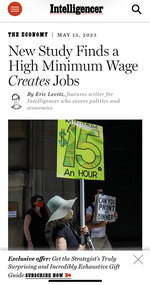As I've pointed out before this is deceptive data.The average ratio of CEO to average paid worker in a corporation, was about 20-1 in 1965. Now, it's as high as 300 to 1, and always at least 70 to 1. Look it up, if you don't believe me. WTF! Nobody is worth that much pay and how many millions does one need to live? Yet, we shouldn't raise the minimum wage? I've got news for Loren. Even Walmart is now starting it's new employees at 14 to 15 dollars per hour, not great but about twice what the legal minimum wage has been since about 2009. So, while it certainly does need to be increased, supply and demand has already increased it to some extent. There is a small nonprofit in my town that has been begging for help for well over a year. The starting pay is only 11 dollars per hour, poor pay but still more than the current minimum wage, and at least this organization provides good benefits and a pension. It's crazy to say that raising the minimum wage, which is currently pauper pay is gong to cause job losses. There are too many jobs that can't be filled, from retail to nursing assistants, to entry level mechanics etc. etc. Does Loren even realize what companies are paying these days? I don't think anyone is paying 7.25 an hour because nobody is going to work for that pittance. It needs to be 15 dollars an hour at a minimum, which most employers are already paying.
There has been a lot of consolidation. Fewer, bigger companies. The bigger the company the higher the ratio of CEO to average worker pay.
The market isn't driven by what people need to live on, it's driven by what you need to pay to get sufficiently qualified people. The minimum to live on is welfare--the government's job, not businesses job.

